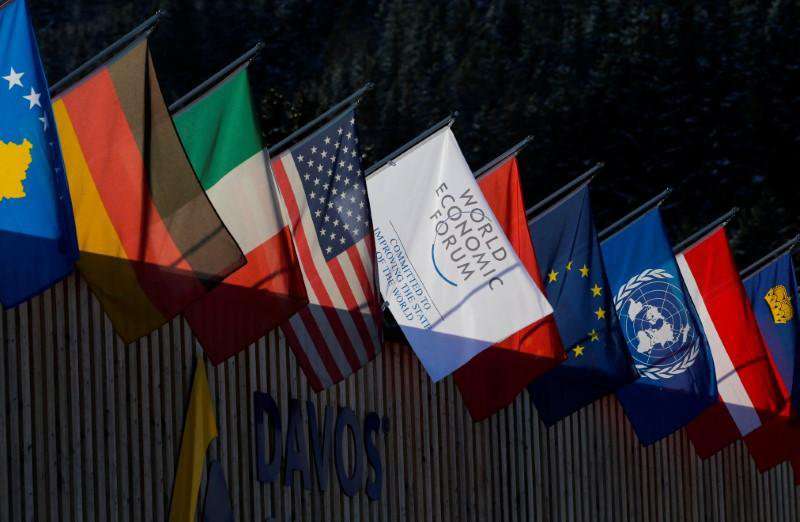LONDON (Reuters) - A majority of people around the world believe capitalism in its current form is doing more harm than good, a survey found ahead of this week’s Davos meeting of business and political leaders.
FILE PHOTO: The national flags of several countries and a flag with the logo of the World Economic Forum (WEF) fly at the roof of the congress center during preparations for the annual WEF meeting in the Swiss Alps resort of Davos, Switzerland January 19, 2020. REUTERS/Denis Balibouse
This year was the first time the “Edelman Trust Barometer”, which for two decades has polled tens of thousands of people on their trust in core institutions, sought to understand how capitalism itself was viewed.
The study’s authors said that earlier surveys showing a rising sense of inequality prompted them to ask whether citizens were now starting to have more fundamental doubts about the capitalist-based democracies of the West.
“The answer is yes,” David Bersoff, lead researcher on the study produced by U.S. communications company Edelman.
“People are questioning at that level whether what we have today, and the world we live in today, is optimized for their having a good future.”
The poll contacted over 34,000 people in 28 countries, from Western liberal democracies like the United States and France to those based on a different model such as China and Russia, with 56% agreeing that “capitalism as it exists today does more harm than good in the world”.
The survey was launched in 2000 to explore the theories of political scientist Francis Fukuyama, who after the collapse of communism declared that liberal capitalist democracy had seen off rival ideologies and so represented “the end of history”.
That conclusion has since been challenged by critics who point to everything from the rising influence of China to the spread of autocratic leaders, trade protectionism and worsening inequality in the wake of the 2007/08 global financial crisis.
On a national level, lack of trust in capitalism was highest in Thailand and India on 75% and 74% respectively, with France close behind on 69%. Majorities prevailed in other Asian, European, Gulf, African and Latin American states.
Only in Australia, Canada, the United States, South Korea, Hong Kong and Japan did majorities disagree with the assertion that capitalism currently did more harm than good.
The survey confirmed a by-now familiar set of concerns ranging from worries about the pace of technological progress and job insecurity, to distrust of the media and a sense that national governments were not up to the challenges of the day.
Within the data there were divergences, with Asians more optimistic about their economic prospects than others across the world. There was also a growing split in attitudes according to status, with the affluent and college-educated much more likely to have faith in how things were being run.
Of possible interest to corporate leaders gathering in Davos this week was the finding that trust in business outweighed that in governments and that 92% of employees said CEOs should speak out on the social and ethical issues of the day.
“Business has leapt into the void left by populist and partisan government,” said Edelman CEO Richard Edelman. “It can no longer be business as usual, with an exclusive focus on shareholder returns.”

dsync1 on January 20th, 2020 at 15:26 UTC »
If the world is like reddit, most people have no idea what capitalism, socialism, communism etc. actually are. People surveyed last week in the US thought socialism meant companies putting forth standards for equality and diversity..
lifeisashitpost on January 20th, 2020 at 10:33 UTC »
One thing I've noticed is that even though there is a lot of popular dissatisfaction with the whole economic-political construct that we live in, inside the political sphere the narrative and what's acceptable to be debated is incredibly narrow.
Take a look at the richest, strongest country in history. The are a lot of things going wrong from flawed "democratic" institutions, workers rights,capital being generated in one place and moving to another with no regard for the impact,etc. Yet when you watch a political debate even the ones calling themselves progressives can barely sneak in healthcare and climate into the discussions and they have to campaign for years just for positions like "maybe we shouldn't destroy the prospect for human existence on this planet" and "maybe we can try a bit of this healthcare system that's been working in every developed country for decades".
You can't discuss big, systemic change. You can throw a short statement here and there about inequality but the second you mention organizing in different ways you're just ignored or ridiculed. It's not acceptable to even consider other possibilities. It's like there's a subconscious consensus that even though we have to live with political institutions meaningful political debate is dead.
Aerroon on January 20th, 2020 at 08:49 UTC »
So, let me get this straight: they think capitalism is harmful, but they trust corporations more than the government? They also want CEOs to engage more with local issues? Are they asking for feudalism?